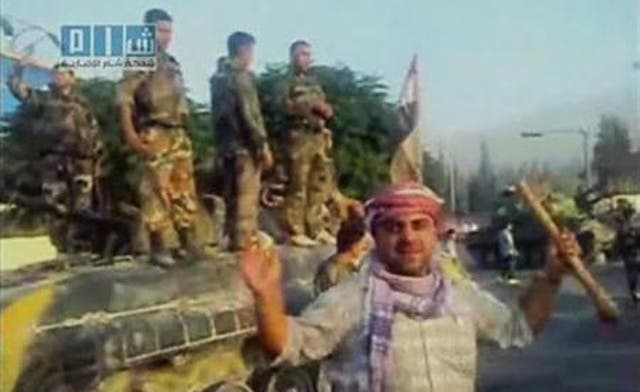Desertions show unease growing in Syrian army
A flurry of desertions from Syria’s military shows unease among the rank-and-file over its repression of unrest but the army's overall clout seems unaffected, allowing President Bashar al-Assad to go on using force to prop up his weakened authority.
Further violence would worsen communal strains in the army, a pivotal power base for Assad, who is from the minority Alawite sect, while more desertions would raise opposition morale as he steps up efforts to crush protests now in their sixth month.
But a tipping point predicted by some analysts, at which a balance of fear favoring the government swings sharply and hastens its collapse, has not been reached.
“Low-level army defections appear to be on the increase, but they are still not affecting the effectiveness of military operations,” a diplomat in the Syrian capital said of the mostly-conscript, 220,000-strong armed forces.
Nikolaos van Dam, a Dutch scholar of Syrian politics and a former senior foreign ministry official, told Reuters that defections from the army were continuing, but as long as they remained modest in scope, involved no loss of heavy weaponry or senior officers, there would be little danger to Assad.
“And if there were to be any sort of military threat to the regime, senior officers would stick together even more,” he said, noting that the fate of many top commanders was closely tied to that of Assad.
“Any attempt at an internal coup would be extremely dangerous for those contemplating it. If they were discovered they would be quickly shot.”
Protesters have been encouraged by the overthrow of Muammar Qaddafi in Libya, whose autocratic rule they saw as similar to Assad's, and growing overseas pressure on the ruling hierarchy.
But Andrew Terrill, Research Professor of National Security Affairs at the U.S. Army War College, told Reuters that large numbers of defections would probably have to occur in Syria “as they did in Libya, if that revolution is going to evolve from mass protests to regime-threatening armed struggle.”
“Defections at this level have not yet taken place.”
Residents and activists in different regions have reported the defection of hundreds among the mostly Sunni Muslim rank and file who managed to evade a Soviet-style system of political commissars and secret police that has ensured virtually no dissent in the military during 41 years of Assad family rule.
Scores of other conscripts have been shot for refusing to fire at pro-democracy protesters, human rights campaigners say.
Others have simply deserted and dropped out of sight.
A factor behind the unease of Sunni soldiers has been attacks by core loyalist Alawite forces on mosques during armored incursions into the cities of Hama and Deir al-Zor last month, with Arab satellite channels repeatedly playing a video purportedly showing the minaret of a mosque in Deir al-Zor falling from tank fire, activists and a former officer said.
The total number of defections from the army stands at about 700 since the uprising began in March, according to estimates by some Syria experts, with many of that number leaving in the Muslim fasting month of Ramadan, which this year fell in August.
Many at first sought refuge in Turkey or Lebanon, residents and exiles say. Now some may be going to Iraq as well.
A tribal sheikh told Reuters from Deir al-Zor in the east that heavy gunfire was heard overnight in the eastern Twaiba neighborhood of the town of Albu Kamal on the border with Iraq.
Citing residents, he said the army was seeking deserters suspected of fleeing to this desolate part of the country, mirroring reports about areas on the border with Turkey and Lebanon where intensified military operations apparently have targeted hideouts of suspected deserters in the last two weeks.
Most army conscripts are from Syria’s Sunni Muslim majority and many come from rural areas targeted in military efforts to suppress six months of street demonstrations against Assad.
Army commanders and security chiefs are mostly from the Alawite sect, an offshoot of Shiite Islam.
Syrian authorities have repeatedly denied that army defections had occurred. They have expelled independent media since the uprising began in March, making it difficult to verify accounts of developments on the ground.
But some purported defections have been captured on video and feature on Internet social networking sites and YouTube.
"We have a dream -- Free Syria," says a sign in English held aloft in another clip of what appears to a protest by hundreds.
Activists and residents have also been reporting increased defections in the central city of Homs and nearby countryside.
Residents of Rastan, a Sunni town near Homs and traditionally an army recruiting ground, published footage on Tuesday purportedly showing defecting soldiers on a balcony greeting a crowd of several thousand at a pro-democracy rally in the town last week.
While the videos’ authenticity remains unconfirmed, they are a boost for opposition activists seeking to complement protests with an information and diplomatic campaign to unseat Assad.
Speculation about army unity intensified a week after Qaddafi’s fall, when an armored government force surrounded a town near the city of Homs on August 29 and fired heavy machineguns, in the wake of the defection of tens of soldiers in the area, activists and residents said.
In Jerusalem, Ehud Yaari, Middle East analyst for Israel's top-rated Channel Two television news, told Reuters hundreds of soldiers up to lieutenant-colonel rank had quit, but very few were Alawites. There was no serious army rift as yet.
He said that “at the end of the day” generals would probably act to oust Assad to preserve sectarian co-existence.
Patrick Seale, biographer of Bashar’s father, Hafez al-Assad, said that as long as the army and security services were loyal it would be extremely difficult for Assad to be toppled.
“It looks to me like a long drawn-out conflict,” he said.
